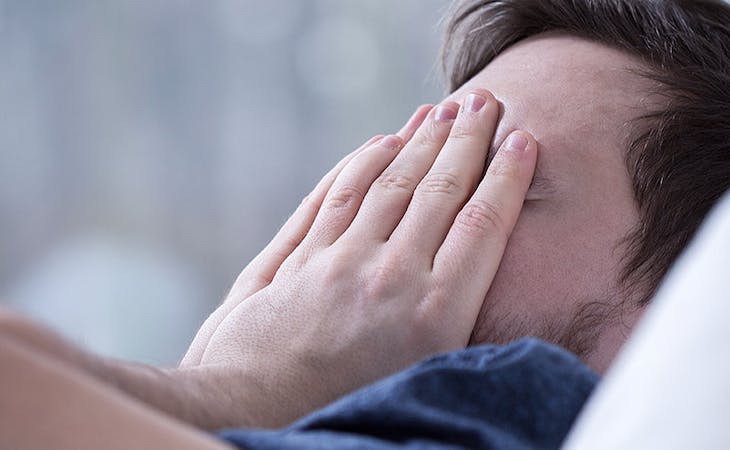It’s widely recognized as a form of torture, and one expert calls it “low-level brain damage.” For many people though, sleep deprivation is just another part of life. Roughly 35% of U.S. adults report getting less than seven hours of sleep on a typical night. According to most health professionals, that’s insufficient and may contribute to other chronic conditions, like heart disease and diabetes. Although we don’t fully understand the effects of sleep deprivation, we know enough to worry.
The dangers of not getting enough sleep
There are differences between acute sleep deprivation—a sudden, severe and uninterrupted episode of wakefulness—and chronic sleep deprivation, the prolonged but less extreme lack of sleep common in industrialized nations. Both, however, are dangerous in their own ways: Several days without sleep can kill you, but several nights of less than six hours’ sleep can dramatically increase your risk of premature death over time.
Even one night of poor sleep can have profound effects throughout your body, contributing to a whole host of medical problems. Some of the effects can be reversed; others can’t. Here are some of the things that can happen to your body when you don’t get enough sleep.
Brain
Sleep is essential memory formation, but it also helps us stave off dementia. One night of good sleep can return beta-amyloid levels to normal, but continued sleep deprivation could be a risk factor for Alzheimer’s.
That’s not the only thing happening in the sleep-deprived brain. If you go one even night without sleep, your emotions can run wild. A 2007 study found that after roughly 36 hours of wakefulness, the amygdala, where the brain processes emotions, showed increased activity in response to negative stimuli. In other words, subjects with acute sleep deprivation were more prone to negative emotions than someone with healthy sleep. Sleepless nights can make us feel miserable in more ways than one.
Nervous system
The nervous system runs through our entire body, controlling everything from mood to reaction times—and it’s utterly dependent on getting enough sleep to function. The connection between sleep and the nervous system is so strong that sometimes it’s hard to disentangle the two. As psychiatrist Dr. Joyce Walseben told The Atlantic, “Mood and sleep use the same neurotransmitters…It’s very hard to tell if someone has sleep loss or depression.” Sleep helps to regulate neurotransmitters such as norepinephrine, serotonin, and dopamine. When these chemicals get out of whack, it can lead to mood disorders such as depression and bipolar disorder. It’s no wonder, then, that research shows that sleep-deprived people are more likely to develop psychological problems such as these.
Dopamine is broadly responsible for a range of brain functions, as well as the feeling of alertness. Since normal dopamine levels require healthy sleep, that could be why sleep deprivation dramatically slows reaction times, and why lack of sleep is responsible for more fatalities than alcohol, according to one expert. In fact, the effects of severe sleep deprivation and alcohol intoxication are more or less the same. Although we don’t often treat them with equal concern, driving tired is just as dangerous as driving drunk.
Cardiovascular system
Every authority on sleep tells us that sleep deprivation can increase the risk of heart disease. What’s the connection? Put simply, lack of sleep increases heart rate and raises blood pressure. In fact, the heart is so sensitive to disruptions in sleep that we see a marked increase in heart attacks on the morning after daylight savings begins. The American Cardiovascular Society suggests that even the loss of an hour’s sleep, combined with other stress factors, can have detrimental effects. The heart is the most tireless muscle in the body, but even it needs a break from time to time.
We see harmful changes in our blood, too. For example, sleeping less then six hours a night is associated with prediabetic levels of blood glucose and insulin, as well as an increased risk of coronary artery calcification (the development of obstructive plaque, which can cause heart attacks). We also see evidence of damage to the immune system: a single night of sleep disturbance leads to lower levels of “natural killer cells” in the blood, which typically fight off tumors and viruses. That’s why some experts think that sleep deprivation is associated with an increased risk of cancer. Most of these changes can be reversed after one night of good sleep, but pose serious threats if deprivation persists.
Endocrine system
The endocrine system involves hormones that regulate everything from growth to appetite to sex drive. You won’t be surprised to learn that sleep deprivation interferes with all of this, too. A week’s worth of bad sleep, according to one study, can lead to a 10% to 15% reduction in testosterone levels in otherwise healthy males. (To give you an idea, we might expect to see a 1% to 2% decrease in a normal year.) That means that sleepless nights are literally aging us beyond our years, giving us symptoms like “low energy, reduced libido, poor concentration, and increased sleepiness,” which are typical indicators of low testosterone levels. Luckily, a few nights of healthy sleep can restore this hormone to healthy levels.
Finally, lack of sleep throws our hunger-regulating hormones out of whack, too. Poor sleep leads to lower levels of leptin (which causes feelings of fullness) and higher levels of ghrelin (which makes us feel hungry). As a result, wakefulness can cause weight gain, which in turn can increase the risk of many of the health hazards listed above.
The bottom line
Our bodies are complex; it’s hard to know where one problem begins and another ends. However, there’s one thing that science suggests overwhelmingly as a contributing factor to most health problems, and that’s—you guessed it—lack of sleep. But don’t panic! There are lots of things you can do to make sure you’re getting the sleep you need. Set some goals for yourself, try these simple, relaxing techniques from the comfort of your own bed, or maybe even sleep naked (or with a weighted blanket!). Make sure you know when to replace your old mattress and how to improve your bedroom air quality. In short, there are countless things you can do to tackle your sleep problems. It may seem daunting, but start with something manageable. If we know anything about sleep, it’s that it’s worth the effort!







